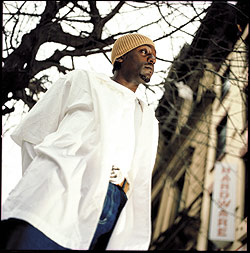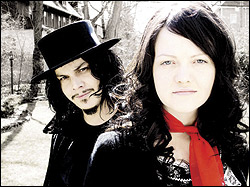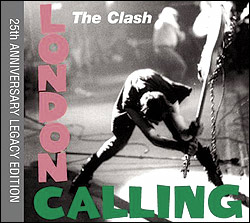JEAN GRAE
This Week
(Babygrande)
Jean Grae is the best complainer in hip-hop. As the one MC who has the most right comparing her persona to that of the Bride from Kill Bill (as she does in “A-Alikes”), looking bad ass in a tracksuit and pureeing foes until she’s respirating their blood, she spits every verse like she’s pissed off that she still has something to prove. It’s not like she hasn’t proved it already. From the moment she stammered nine minutes of panic-attack school-shooting drama on “Taco Day,” from Mr. Len’s 2001 album Pity the Fool, she showed anyone who could endure the track’s stomach-turning narrative that she had skills to burn. And they burned everyone: the industry, critics, a litany of sucker MCs, hip-hop in general, herself. But This Week takes a different tack—a year after she vented “rap’s dead, rap sucks” on last year’s Bootleg of the Bootleg EP, she saves her hate for a few sharp, sparse asides and focuses primarily on displaying her range of personality traits, underscoring the humanistic, real-world approach to hip-hop hinted at by her 2002 debut, Attack of the Attacking Things.
A supposed concept album that spans the course of seven days, This Week‘s thematic cohesion is as scattershot as its choice of beats—Midi Mafia club whirs; 9th Wonder soul thumps; a centrifugal head-rush loop from Funkadelic’s “I Got a Thing, You Got a Thing, Everybody’s Got a Thing.” The narrative holds together just long enough to deliver a three-song flirt/hook-up/romance story line, then sprawls out into a collection of tracks that alternately boast and self-deprecate, often in the span of a single verse. Grae’s modest and forgiving to wronged friends in the correspondence-centered “P.S.,” stricken with Geto Boys–esque hip-hop paranoia in “Going Crazy,” confidently introspective on “Don’t Rush Me,” furious nearly everywhere else.
There’s still plenty of step-off battle rap antagonism: “You Don’t Want It” is classic punch line–dis boasting (“Lord Jesus/I got many more reasons/To maul y’all raw like venereal diseases”), and when she spits rhymes about suicidal cover shots and her superior castration technique on “The Wall,” that whole “hell hath no fury” thing becomes a lot more understandable. But for a woman scorned by the industry and a media that tries making her wear bikinis during cover shoots, she has the right to be mad for not being massive, because she rocks shit massive—like Missy Elliott in David Cronenberg’s The (Supa Dupa) Fly, caught in a matter transportation mishap during the recording of “Busa Rhymes” and winding up with Eminem DNA. Be afraid. Be very afraid.
MASTA ACE
A Long Hot Summer
(M3)
Grae has a long career ahead of her, but Juice Crew vet Masta Ace is planning to hang up the mike after this last effort at detailing his experiences with a tumultuous industry. Ace has more reason than most to go after shady record-label cats: The only thing keeping tracks like his 1994 classic “Born to Roll” from being heavy-rotation hits was inept promotion and increasingly fickle and divided mainstream tastes (a New York cat doing G-funk in ’94? Oh, hell no).
Nothing on A Long Hot Summer is as hot as “Roll,” and it takes a while to register. Initially, it might sound like he gave up trying, resigned to fade to black under conditions less ideal than they should’ve been, not letting the door hit his ass but bringing his foot into a few other peoples’ on the way out. Under further scrutiny and a more sympathetic ear, though, it’s easier to find him as a justifiably bitter veteran who never got his platinum due, a lyrical Patrick Ewing who was great at what he did but never got the championship ring to show for it. His lyrics falter occasionally (particularly on the first couple tracks, which are enough to damage first-listen impressions), but he’s still sharper than most indie-rap new jacks (including the guest MCs—how could Punch & Words fall off so hard since their spot on the Black Star record?). The jaded-vet tone is kind of redundant, with the album’s stylistic turf done better on 2001’s Disposable Arts. But his love-hate nature toward the game is expressed clearly and expertly in one 12-inch single—”Good Ol’ Love,” about the fulfillment hip-hop brings, b/w with “The Ways,” about those damn A&R chump-asses. Industry Rule No. 4,080 claims another great.
PRINCE PO
The Slickness
(Lex)
Where the hell did this come from? Pharoahe Monch hasn’t been all that noisy since he got the fuck up five years ago, and “Simon Says” was huge—so who’d’a thunk that his almost-forgotten Organized Konfusion partner would drop a stealth bomb on everyone’s unsuspecting head? Guests are everywhere: a goofy-as-usual MF Doom, a dirrrty Raekwon, J-Ro and J-Zone teetering around like masters of drunken kung-fu—but even through the noisy, triple-sick, sledgehammer-of-bass beats, straight from a ’70s grind-house soundtrack that Quentin Tarantino’d hyperventilate over (provided, in part, by Beatle-ganker extraordinaire Danger Mouse), Prince Po lords over Slickness with avalanche verbiage, too busy finding ways to get in your girl’s business and slinging razor-edge shuriken darts to notice he’s being slept on.
Prince Po plays Neumo’s with RJD2 and Hangar 18 at 8 p.m. Mon., Oct. 19. $13 adv.








